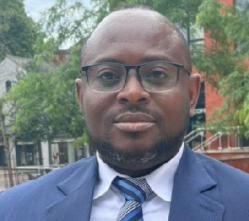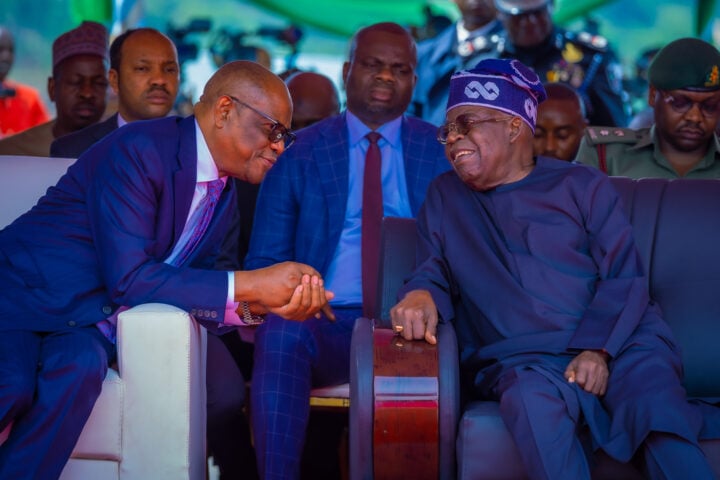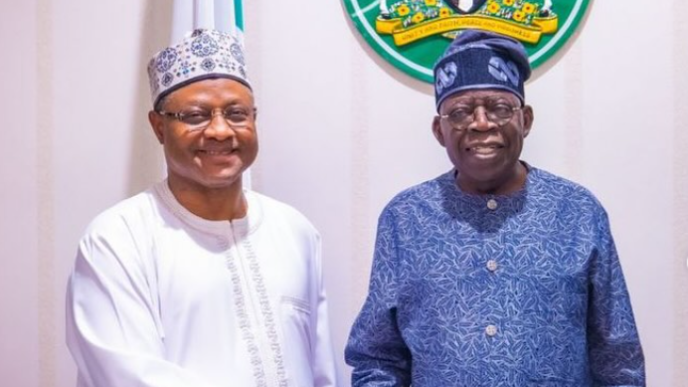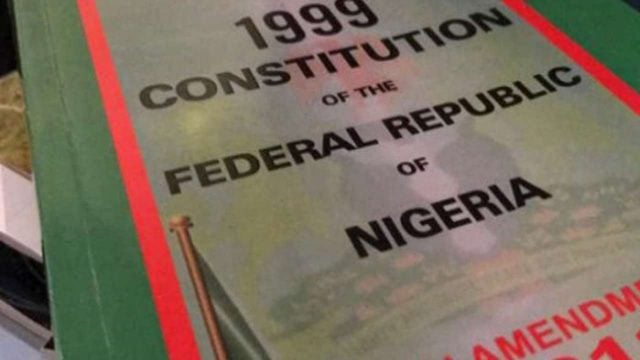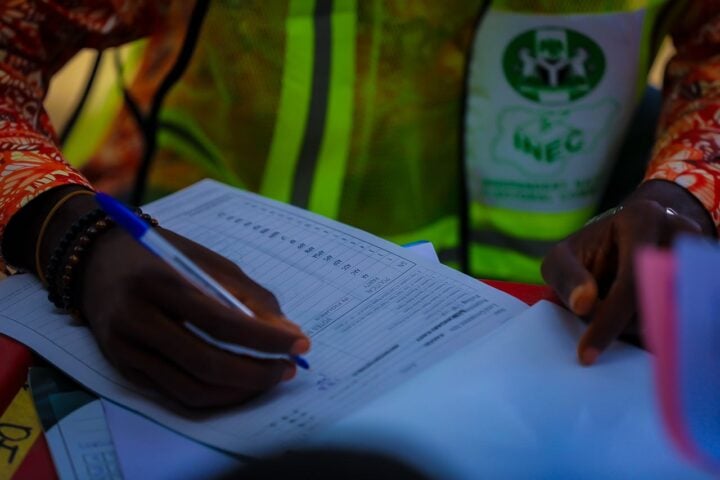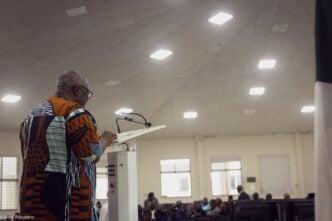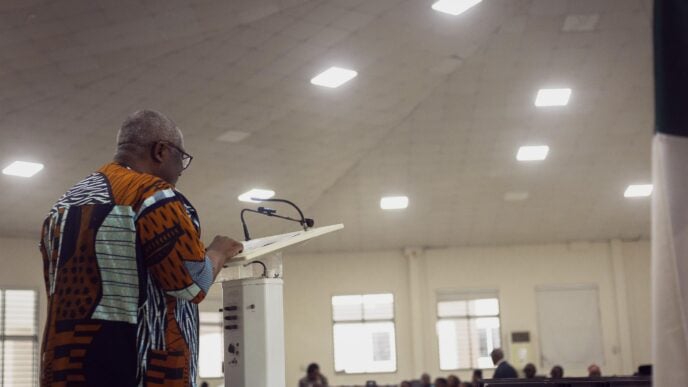President Bola Tinubu and Nyesom Wike, the FCT minister | File photo
The recent challenge issued by FCT Minister Nyesom Wike to President Bola Tinubu over the long-buried forensic audit report of the Niger Delta Development Commission (NDDC) is a topical issue that should be given serious consideration, especially in an era of heightened public demand for accountability and transparency.
Wike’s bold declaration—stating that he would resign from Tinubu’s cabinet if the report fails to substantiate his corruption allegations—is more than political theatre. It is a test of the president’s commitment to transparency, anti-corruption, and political courage to do what is right in the interest of the country and the constitution he swore to uphold.
Earlier this month, Wike, in his monthly ‘presidential’ media chat, had alleged that Judith Amaechi, the wife of his former boss in Rivers state, Rotimi Amaechi, was receiving N4bn monthly from the interventionist agency through her NGO. During the interview, the FCT minister asked President Tinubu to publish the forensic audit report of the NDDC, adding that if his claim was not there, he would resign as minister.
Amaechi, however, broke her silence last week. Speaking through her media aide, Dike Bekwele, she challenged Wike to make public his version of the forensic audit report on the NDDC, where either she or her non-governmental organisation, Empowerment Support Initiative, was indicted. Failure to do so, she said, Wike should make good on his threat to resign as FCT minister. Wike and Amaechi’s wife wanted the report published so as to clear all allegations. Nigerians also wanted the report published because of the national attention the NDDC saga generated, especially in July 2020. The current senate president, Godswill Akpabio, who was then the Niger Delta minister, accused members of the national assembly of cornering most of the contracts in the NDDC during a national assembly investigative hearing.
Advertisement
Responding to questions from the panel members on how contracts were handed out in the NDDC, Akpabio said, “most of the contracts in the NDDC are given out to members of the national assembly, but you don’t know about it.” In a frantic bid to stop Akpabio from spilling the beans, the chairman of the investigative panel, Thomas Ereyitomi, kept shouting, “Honourable minister, it’s okay, it’s okay. Off your mic!” That cliché ‘off your mic’ has become a mainstay in Nigeria’s lexicon today.
Who can remember the episode of Kemebradikumo Pondei, the acting managing director of the NDDC? On July 20, 2020, while testifying before a session of the house of representatives committee probing the NDDC over alleged mismanagement of N81.5 billion by the interim management of the NDDC led by him. After he was revived, he was taken out of the venue, and that was the end of the discussion. Femi Gbajabiamila, speaker of the house of representatives and current chief of staff to the president, later said there was no need for Pondei to appear before the panel again to provide answers on the questions bothering on stewardship of the NDDC under his watch. Despite his denial, many Nigerians believed Pondei only acted out a drama and pretended to faint in order to avoid answering weighty questions from the investigative panel.
For years, the NDDC has been a case study in how development agencies can be turned into engines of patronage. Billions of naira have been poured into the Niger Delta under the pretence of infrastructure and empowerment, with very little to show. The forensic audit ordered by the immediate past president of Nigeria, the late President Muhammadu Buhari, was supposed to be a turning point. Instead, it has become a ghost document—spoken about, rarely seen.
Advertisement
Now, Wike, a sitting minister and former governor of Rivers, has thrown down the gauntlet. He claims the report implicates powerful interests, including the family of his former boss and long-time political rival, Rotimi Amaechi. But beyond the personalities involved, the real issue is this: why is the report still hidden from the public? Is the federal government trying to hide anything? What did Wike know about the report that made him boast with his ‘full chest’ that he will resign if Amaechi’s wife is not indicted? Will President Tinubu accept Wike’s challenge?
President Tinubu campaigned on the promise of renewed hope. Nigerians hoped that his administration would move beyond the cosmetic reforms of the past and tackle the rot in public institutions head-on. Here lies his chance. Releasing the NDDC audit report would send a clear message that no one is above scrutiny—not even political allies or members of his own party. It would also affirm the principle that public funds must be accounted for, no matter whose ox is gored.
If the report vindicates Wike, so be it. If it exposes exaggeration or falsehood, then Wike’s offer to resign must be taken seriously. Either way, Nigeria wins—because the public would have been treated with the dignity of truth.
But failure to act, or to remain silent, risks eroding whatever credibility this administration has managed to build. It reinforces the dangerous idea that anti-corruption talk in Nigeria is just that—talk. Worse, it suggests that even the most important institutions of oversight, like the NDDC, can be manipulated, looted, and shielded from public view with no consequence.
Advertisement
SERAP has already taken the matter to the ECOWAS Court. Civil society is watching. The Niger Delta, still struggling under the weight of underdevelopment and oil-fuelled neglect, deserves better.
President Tinubu has a choice: to meet Wike’s challenge with integrity and transparency—or to remain silent and let another opportunity for real reform slip away. History will remember what he chooses.
Lastly, the failure of the government to release the report aptly captures the wastage of taxpayers money by successive governments in Nigeria. In 2014, the Peoples Democratic Party (PDP)-led federal government spent over N10 billion to convene a national conference where 494 delegates gathered together in order to proffer workable suggestions on how to move the nation forward. At the end of the conference, over 600 recommendations were made for the improvement of the political, economic, and social structures, with suggestions about steps to be taken to improve the security of lives and property of Nigerians. However, the report has not been considered to date. In January 2018, the ruling APC also set up a 23-man committee on true federalism, headed by the immediate past governor of Kaduna state, Nasir el-Rufai, which submitted its report on January 14, 2018. The report is also yet to be implemented.
A former Senior Advocate of Nigeria (SAN), the late Ladi Rotimi Williams once described Nigeria as ‘a government of the committee, by the committee, and for the committee.’ When serious issues occur that require urgent attention, the federal government is always very quick to set up committees, ad hoc panels, delegations, and all manner of groups. After deliberating for days with public funds, the committee then comes up with a report that the government will abandon ‘in the archives.’ Of what use, then, are these worthless committees?
Advertisement
For now, it remains to be seen if President Tinubu will accept Wike’s challenge and release the forensic audit report of the NDDC. Nigerians are watching.
Akinsuyi, former group politics editor of the Daily Independent, writes from Abuja. He can be reached at [email protected]
Advertisement
Views expressed by contributors are strictly personal and not of TheCable.
